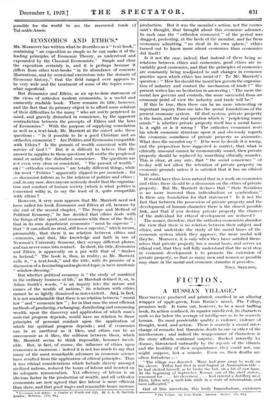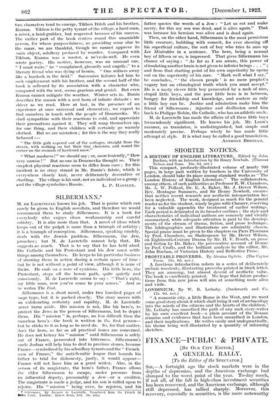FICTION.
A RUSSIAN VILLAGE.* BEAUTIFULLY produced and printed, swathed in an alluring wrapper of apple-green, Ivan Bunin'ii novel, The Village, promises well. It turns out, however, to be a most baffling book, its action confused, its squalor unrelieved, its characters sunk so far below the average of intelligence as to be scarcely human. Its most ponderable quality is violence, violence of thought, word, and action. There is scarcely a casual inter-
change of remarks but threatens death to one or other of the interlocutors ; and indeed the reappearance of characters in the story affords continual surprise. Hacked inwardly by disease, threatened outwardly by the rigours of the climate and the hostility of their acquaintance, they could not, one might suppbse, last a minute. Even so, their deaths are often fortuitous :-
" The village was deserted. Many had gone away to work on the clover. Trifon had died in mid-August at Assumption-tide- he had choked himself, as he broke the fast, on a hit of raw ham. At the beginning of September, Komar, one of the chief rioters, renowned for .; . . his cleverness . . . had entered a distillery near Eletz, fallen into a malt-kiln while in a state of intoxication, and been suffocated."
Out of this uncertain, this truly funambulous, existence
• The Village. By Ivan Butts. London : Becker. 173. &LI two characters tend to emerge, Tikhon Ititch and his brother, Kuzma. Tikhon is the petty tyrant of the village, a hard man, a miser, a land-grabber, but respected because of his success. The earlier part of the book centres round this unamiable person, for whose purposefulness, as providing some clue to the maze, we are thankful, though we cannot approve its main object, adultery prefaced by murder. Compared with Tikhon, Kuzma was a waster, a ne'er-do-well. He even wrote poetry. His motive, however, was an unusual one. " I must write," he " complained, gloomily and angrily," to a
literary friend who was dying of hernia. One withers away like a burdock in the field." Successive failures led him to seek employment with his brother, and the second half of the book is softened by its association with a character who, compared with the rest, seems gracious and genial. But even Kuzma cannot mitigate the weather. Winter sets in. Bunin describes the season with a zest born of infinite distaste : we shiver as we read. Here at last, in the presence of an experience at once universal and elementary, we expect to find ourselves in touch with the people of Dournovka. We shall sympathize with their reactions to cold, and appreciate their precautions against it. They will wrap themselves up, for one thing, and their children will certainly go warmly clothed. But we arc mistaken ; for this is the way they really behaved :-
" The little girls capered out of the cottages, straight from the stoves, with nothing on but their tiny chemises, and round the corner on the mounds of hardened snow."
" What madness !" we should say ; or, more leniently," How very unwise !" But no one in Dournovka thought so. Their simplest physical reactions seem to differ from ours ; for this incident is no stray strand in Mr. Bunin's fabric, which is everywhere closely knit, never deliberately decorative or startling. The village is his unit, not an individual or a group ;
and the village symbolizes Russia. L. P. HARTLEY.



























































 Previous page
Previous page